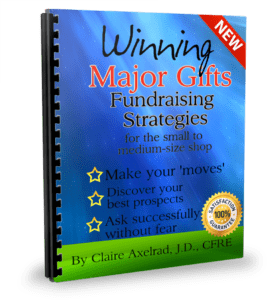
7 secrets to a rip roaring major gifts program
Every nonprofit should have a major gifts program.
That’s where the lion’s share of the money is.
It’s a rare organization that has a mailing list large enough to raise a million dollars from a million different $1 donors. But most nonprofits do have major donor prospects hiding in plain sight.
It’s up to you to find them; then move them along a cultivation path that prepares them – and you – to make an ask that results in a win/win values-based exchange.
Let’s review 7 secrets that will guarantee your major gifts program is a success, whatever your size.
1. Cultivate the Right People
Too many is, well, too many. One full-time person can only handle a portfolio of 150.
More than that, and you’re only going to have time for “transactions.” Sure, you can ask for gifts. But you’ll likely leave a lot of money on the table. Folks may give you $1,000, when they could have given $10,000. Or they’ll give you money this one time, but they’re unlikely to repeat their giving.
Which is why truly successful major gift fundraisers know you must “qualify” folks to assure they’re likely to want to build a stronger relationship with you.
And, guess what? Typically only about a third of the folks on your preliminary caseload list will wind up on your final, carefully honed major donor portfolio.
Money (capacity) and history (past gifts) alone does not signify a desire to be “cultivated.”
Some people like to be wined and dined. Some really want to be part of a community. Others simply want to make a gift; then be left alone. You may be “on their list,” but not a top priority.
You need to take some proactive steps to find out! Call them. Send them a letter. See if they’d like to meet with you. Or attend an event. Or otherwise engage.
This is a process. And an essential step towards developing a genuine major gift fundraising program.
2. Have a Personal Revenue Goal for Every Donor on Your Caseload
You have to carefully consider this for each prospect, based on past giving, current affiliations with you and others, recent actions and research.
If your plan is to simply ask every prospect for $5,000, because that’s your major donor “level,” you’ll inevitably ask some folks for too much and some for too little.
Major gift fundraising is nothing if not personal.
Trust me.
- I’ve had the occasion to ask someone for less than they were considering. They were offended I didn’t consider them more of a “VIP.”
- I’ve had the occasion to ask someone for more than they were capable of. They burst out laughing and no longer took me seriously.
Please learn from my mistakes.
3. Have a Strategy that Gets You to Your Goals
Write it down!
Without a written plan, you’re doomed. Sure, you’ll get things done. But they likely won’t be the best things you could have done.
Work smart, not just hard.
For a major gifts program to be successful, you’ll need to develop individualized cultivation and solicitation plans for each prospect.
You’ll want a list of “touches” or “moves” you’ve considered ahead of time.
You’ll want to make sure you’ve got the right person making each move.
And you’ll want to calendar these moves for each prospect in your portfolio.
4. Ask Your Donor to Give!
Too often, nonprofits cultivate, cultivate and cultivate. But they never get to the “ask” because they’re uncertain their prospect is “ready.”
At best, this confuses your donor.
At worst, it pisses them off.
- Don’t waste your donor’s time.
- Don’t waste your time.
- Don’t waste your organization’s resources.
Follow your planned cultivation strategy. This will tell you when the time is right.
When it is, ask!
Oh, and make sure you have the right solicitor make the ask.
There is no one right solicitor for every prospect. Ask yourself a series of questions from the perspective of your targeted prospect. Does the prospect know who the asker is? Will the asker be perceived as important, authoritative, credible, friendly or otherwise persuasive?
5. Thank Your Donor Promptly, Personally and Powerfully
Giving is not always its own reward.
It’s up to you to reward your donor.
- Do this within 48 hours.
- Have the right person do the thanking. The one who will mean the most to the donor.
- Powerfully demonstrate the impact of the donor’s gift. Help the donor really be the hero!
If you want gifts, you must give them.
6. Report on Outcomes
This is crucial if you ever want to get another gift!
Major gifts are an investment, and folks need regular reports on how their investments are doing.
The main reason people give is to make a difference.
They worry a bit that their gift did not have its intended impact.
You can’t just tell them once either, because good news wears off fast. Research shows that to be meaningful, gratitude must be repeated.
In addition, people want to be valued for more than just their money. If you thank once, and then every other communication is another appeal, people don’t get to feel the joy they deserve to feel from making a real difference.
7. Hold People Accountable
Ever heard that “what gets measured gets done?”
- Managers must sit down with major gift fundraisers to review their goals and actions on a regular basis.
- Major gift officers must sit down with volunteer fundraisers to review their progress, and offer support and encouragement.
If you don’t hold folks’ feet to the fire, the warmth never gets to its intended place.
In this case, the ultimate warmth of a successful ask is two-fold:
- The warmth of furthering your mission.
- The warm and fuzzy feeling your major donor will have!
Want to Be a More Successful Major Gift Fundraiser?

You can’t afford not to ask for major gifts. Registration closes January 19th.
I’m offering my popular 8-week Winning Major Gifts Strategies e-course again commencing January 22nd. You’ll learn everything you need to know to set up (or accelerate) a strong major gift program. With the reduced tax incentive to give for small and mid-level donors, it makes sense to focus efforts on wealthier donors. If you’re not making many face-to-face visits and asks, you need to start.
NOTE: The ‘Early Bird’ discount flies away December 29th, so you may want to grab your spot now (slots are limited). Questions? Just let me know!
Major gift fundraising has always given charities the biggest bang for the buck. Moving forward, this will be truer than ever.
Photo by Piet Bakker from Pexels





